http://www.guardian.co.uk/world/2012/nov/20/catalonia-tax-burden-independence
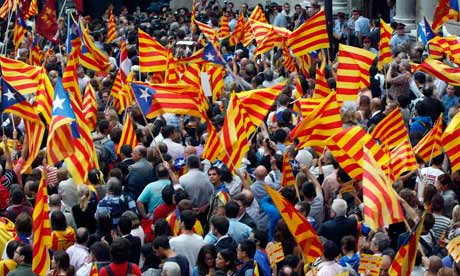
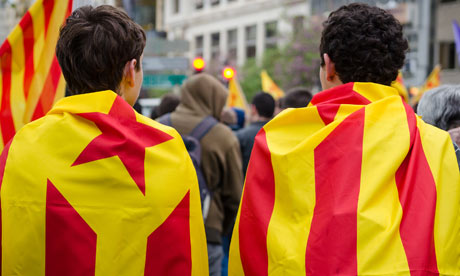
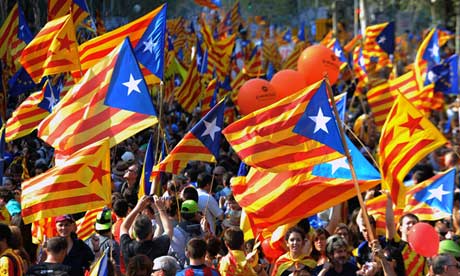
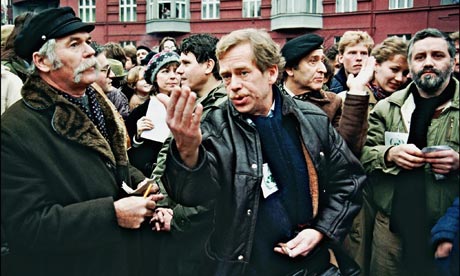
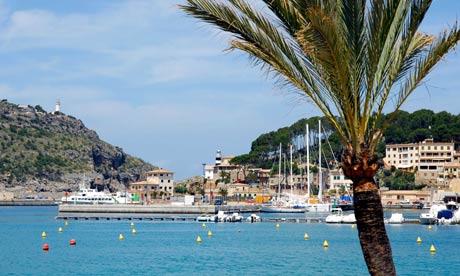
Catalonia's tax burden: 'If you put up with it, they keep taking your money'
Voters who believe their taxes are funding poorer, 'lazy' regions in Spain are rallying to the separatist cause

A pro-independence rally in Barcelona this year. Catalonia has built up Spain's biggest regional debt and had to ask for a bailout from the central government. Photograph: Gustau Nacarino/Reuters
When Josep Rovirosa, a 50-year-old Catalan bank worker, drives along the motorway into Barcelona he often arrives at the toll gate with rebellion in mind. "I drive up and say 'good morning, I'm not paying'. Then I drive on and they take my number plate." Fines, he expects, will start coming soon.
Rovirosa is part of a growing campaign of disobedience on toll motorways, which many Catalans see as a symbol of how they must pay for services that other Spaniards get free – made worse by a nagging suspicion that their taxes support lazy lifestyles in poorer parts of the country.
"Almost all motorways in Catalonia have tolls, but our money goes to building toll-free roads across the rest of Spain," says Rovirosa. "We have so many grievances. If you just put up with it, they keep on taking away your money."
Bus driver and General Workers union activist Carlos Heras agrees. When he travelled to Madrid to join a protest against austerity measures across the country recently, the first thing he did was check the price at parking meters in the Spanish capital. "You see," he says. "It would be twice the price in Barcelona."
Even leftwingers such as Heras think Catalans are being starved of money to subsidise other parts of the country that do not deserve it.
As fierce austerity measures hit local health services and schools, anger about money has helped tip a majority of Catalans questioned by pollsters into backing independence, with support leaping from 43% to 57% in 15 months.
"More than 80% think Catalonia is underfunded," says Jordi Sauret, of Feedback pollsters. "That idea is now deeply entrenched."
On paper Rovirosa and Heras are right. Catalonia's fiscal deficit – the difference between the money it pays to Madrid and, after taking some funds to pay state costs, the money it gets back – is €16bn, or 8% of the region's GDP, according to the Catalan government.
Eighty per cent of Catalans tell pollsters that they pay too much and get too little back from the Spanish state.
At separatist rallies, the poorer regions of Andalusia and Extremadura are held up as places where lazy people live off the hard work and taxes of Catalonia. Almost one-third of workers in the Andalusian province of Cádiz are on disability pensions, says Alfons López Tena of the Solidaritat Catalana party at a rally in the coastal town of Mataró. "Spain also steals our pension money," he adds. "We pay Swedish-style taxes but have Senegalese-style public services."
Catalonia has some of the highest income tax rates in Europe. It has also built up the biggest regional debt in Spain and, with its bonds given junk status by ratings agencies, has this year had to request a humiliating bailout from central government in Madrid.
"They say 'if we were independent then we would be solvent', but they are wrong," says the budget minister, Cristóbal Montoro, of the conservative People's party.
Economists argue about whether the cost of independence would be higher or lower than the €16bn a year, and whether Catalonia could finance its debt on the global markets. But all parties at Sunday's regional elections, including the Catalan branch of prime minister Mariano Rajoy's People's party, argue it deserves a bigger slice of the tax cake.
Yet the Balearic Islands and the Madrid region have even higher fiscal deficits, and they are not threatening independence. So what happened to solidarity and redistribution of wealth?
"If the left has talked about lowering income tax, why shouldn't it talk about this too?" asks Miquel Iceta, who heads the Catalan Socialists' Rafael Campalans thinktank. His party, which proposes a new federalist constitution for Spain, is heading for its worst result at these elections.
"If Catalonia is third in the list of those who prove tax income, it can't appear in 10th position among those who receive money back to pay for its expenses," says Joan Saura, a former Catalan government member from the left-leaning Initiative for Catalonia Greens party.
But he criticises the way the regional government of President Artur Mas, which has some tax powers, raises money directly in Catalonia. "In Catalonia you can inherit €5m without paying any tax – but if a child takes their own lunch to school they still get charged €3," he said.
Mas says that money alone will not fix the divide with the rest of Spain. "Part of the problem would go, but not the whole problem," he says. "If we resolve the fiscal deficit and still do not have political decision-making power, then we haven't fixed it all."
Saura disagrees. "Only about 20% are real separatists, but 30% or 40% of Catalans have joined them because of the money and because we are not loved," he says.
Either way, Mas does not plan to scrap toll roads. "I think toll roads will remain," he says. "Europe is heading towards a model of payment for infrastructure by users rather than by the citizens via taxes. It is Spain that is outside this model, not Catalonia."
and......
http://www.guardian.co.uk/world/2012/nov/19/catalonia-vote-future-spain
Catalonia is voting on its future in Spain – and Madrid is worried
Election will decide whether Catalans risk breaking up the nation by going down separatist road

Protesters wearing Catalonian flags. Photograph: Marc Sardón/Demotix/Corbis
The red and yellow striped flags of Catalonia bobbed about giddily as Lluis Recoder delivered his message: despite the crisis gripping Spain, Catalans could be as rich as Scandinavians.
"If we were a European state we would be seventh in Europe in per capita income, after Denmark and Sweden," the Catalan nationalist and regional government minister declared, to an enthusiastic response. His figures are based on wealth calculations that can look skewed. (Struggling Ireland is, for example, richer on a per capita basis than thriving Germany). But they are seen here at least as proof that Catalonia – a region of almost eight million people – could be not just viable but also wealthy if it were to separate from Spain.
"It is very viable," said Artur Mas, the Catalan president, in an interview with the Guardian. "What is not viable is the current situation."
The Catalan separatist campaign will come to a head this weekend in an election that will in effect serve as a plebiscite on the region's future in Spain.
It is a long-running affair, borne of historical and cultural factors that have persisted for centuries. But you do not have to scratch too hard before you get to the principal bone of contention in crisis-ridden Spain: money.
Spain is suffering its most agonising economic decline in decades. Catalonia has not been spared. But it still claims it subsidises the rest of Spain to the tune of €16bn a year. This money, equivalent to 8% of regional GDP, would dig Catalonia out of a debt and deficit hole and provide greater investment and a better welfare state, many believe. "Obviously there would be transition costs, but in a few years Catalonia would be able to develop its potential," said Elisenda Paluzie, an economist and separatist supporter at the University of Barcelona.
"Catalonia is completely feasible as an independent state with regard to its treasury," said Núria Bosch and Marta Espasa in a study that looks at how the figures would work if Catalonia simply assumed its share of Spanish government spending, and if independence brought no extra costs or damage to the economy. Others are not convinced. "There would be an exodus of companies to Madrid and other European capitals," said Juan Rubio-Ramírez, a Catalan-born economist at Duke University in the US, in La Vanguardia newspaper. Some even foresee a consumer backlash against Catalan products, like the damaging boycott of cava sparkling wine in 2004 sparked by separatist opposition to Madrid's attempts to host the Olympics. Benefits there might be, but there would be costs too. Confecciones Joti, a small textile company that makes work clothing in Vilanova d'Escornalbou, reported last month that a client company had already cancelled an order because of Catalan politicians' "contempt" for the north-western region of Galicia.
Millions of Spaniards view the increasingly strident calls for self-determination in Catalonia with alarm. This is a country with form. When the region last declared its own state in 1934, Madrid answered by declaring a state of war. Separation would provide an ominous precedent in a nation where the increasingly weak centre has spent decades handing new powers to its headstrong regions.
"We have had four civil wars in the past 150 years, so this is no joking matter," Socialist party senator Marcelino Iglesias told a rally in Girona.
Mas has said that his current drive towards independence, even if it fails, will be peaceful. "It will either be done peacefully, or it won't be done," he told the Guardian. But Mas has pledged to hold a referendum and the foreign minister, José Manuel García-Margallo, has warned that the government would get the constitutional court to ban it in advance. "That would be illegal. In legal terms, it would be a coup d'état," he said in a recent interview when asked what would happen if Mas ignored a ban. "There is no right to self-determination and no right to secession."
Members of the Mariano Rajoy's governing conservative People's party worry that Catalan independence will signal the end of Spain. "People talk about Catalonia as if it was a limb that could be amputated and the rest of Spain would survive," the justice minister, Alberto Ruiz-Gallardón, told the ABC daily in an interview. "But what the independence of Catalonia really means is the disappearance of Spain as a nation."
The problem is not just Catalonia. Elections were held in October in the northern Basque country, where the blood spilt by Eta over four decades kept separatism in the headlines but stopped many peaceful Basques supporting it. The vote produced a landslide victory for nationalist and separatist parties, who jointly took two-thirds of the seats. They included EH Bildu, a separatist coalition including Eta's former political front, which took a quarter of the votes, and the Basque Nationalist party (PNV) – divided between a separatist wing and a part that wants to remain Spanish – which won one third.
One in five Basques are unwavering separatists, according to a recent poll by the state's Centre for Sociological Investigation. But another one in five say they would be inclined to support independence. That may grow on the back of referendums in Scotland and Catalonia, said a PNV senator, Iñaki Anasagasti.
"Catalonia is smoothing the way," said the senator, who sees his own party's long-term aim as independence.
If Catalonia and the Basque country left, Spain's economy would shrink by 25% and per capita wealth by 5%. Motorway and rail routes into Europe would also pass through the new states.
"That is why they could not block our future membership of the European Union," said separatist writer and columnist Isabel-Clara Simó.
"The problem for Spain, which is what limits the ability of the prime minister to be flexible, is the dynamics of the breakdown. Once Catalonia is out, the burden on the other rich regions increases, and they will want out," says Luis Garicano of the London School of Economics. "So for Spain the prospect, without Catalonia, is complete disintegration of the country."
This would be a tough moment to try independence. Catalonia's economy is shrinking at 1.1% a year, unemployment is 23% and the local government's debt has been given junk status by ratings agencies, obliging it to ask for a humiliating bailout of its own from central government. It already has the highest regional debt in Spain. But ironically it is this privation that is fanning separatist urges. As fierce austerity measures hit health and school services, anger has helped tip a majority of Catalans quizzed by pollsters into backing independence, with support leaping from 43% to 57% in 15 months. "More than 80% think Catalonia is underfunded," said Jordi Sauret of Feedback pollsters. "That idea is now deeply entrenched."
Anger at the financial situation comes on top of popular fury generated by a 2010 constitutional court ruling that struck out key parts of an autonomy charter approved by Catalans at referendum. "The key moment for me was the constitutional court ruling," said Mas. "When I saw how they humiliated us with that sentence I said: 'This has no future.'"
But a separate Catalonia would have much work to do to create the institutions of state. Catalonia lacks its own inland revenue – something that Mas unsuccessfully tried to demand from Madrid this year. That would complicate tax collection, with economists predicting a loss of up to €1.7bn. "If you have your own treasury then the costs are much less," said Paluzie.
But a state is not just money. Catalonia, which already has its own police force, would need a central bank, a diplomatic service and a dizzying number of other agencies, regulators and institutions. Then there are more nuanced questions. What league would Barcelona football club play in? And would the new country get EU and UN membership? And what about an army? Mas says it does not need one, but would still want to be in Nato. "We don't want armed services," he said. "Our best scheme is to pay for our defence." That assumes Nato would be prepared to protect a Catalonia that was not prepared to spill the blood of its own soldiers.
For now, Catalan separatists are eagerly awaiting Sunday's vote, after which Mas has promised to build a wide consensus of support for a referendum to be held by 2016.
and.....
http://www.guardian.co.uk/world/2012/nov/19/catalonia-leader-secessionist-wave?intcmp=239
Catalonia's leader tries to ride secessionist wave
Artur Mas has promised a referendum within four years. An election on Sunday will serve as a quasi-plebiscite on secession

Supporters of independence for Catalonia demonstrate on 11 September in Barcelona to mark the Spanish region's official day. Photograph: Lluis Gene/AFP/Getty Images
Artur Mas is in buoyant mood. He has just finished preaching to the converted and, for the second time today, has belted out an anthem glorifying 17th-century peasants and warning the enemies of Catalonia to tremble with fear.
But behind the euphoria is a canny pragmatism. Mas, the president of the Catalan Generalitat, is coasting along on a crest of unprecedented support for independence for Catalonia from crisis-ridden Spain. But he's also trying to control it. And he knows it's going to be a giddy journey.
"I have nothing against Spain, absolutely nothing," says the 56-year-old economist, perched on the steps of a makeshift stage from which he addressed a crowd awash with striped Catalan flags. "In many ways I feel that I am a friend – of the Spanish language, of many people in Spain and of many Spanish cultural traditions. But as of many years ago I feel Catalan. I think in Catalan, I don't think in Spanish."
As the financial crisis petrifies across Europe, it is testing the ties that have bound nations together – and nowhere more so than in north-eastern Spain. In September Barcelona witnessed the biggest independence march in Europe since the second world war. That single event transformed Catalonia's long-running quest for ever greater political self-determination.
Polls show the number of those who, like Mas, would vote "yes" to independence has shot up from 43% to 57% in little more than a year. An election on Sunday, 25 November, will serve as a quasi-plebiscite on secession. The Guardian, in collaboration with Catalonia's leading La Vanguardia newspaper, is devoting a week of coverage to the region, asking if secession is a viable or desirable outcome. Even Mas knows it will not be easy.
He has promised a referendum of some kind within four years, but national government ministers in Madrid warn this will be banned. Defiance would be tantamount to a coup d'état, they say. So will he stick to his guns? "There will be a consultation," he insists. Ideally, Mas would ask Catalans an apparently simple question: "Do you want Catalonia to have its own state in the EU?" He would like to strike a deal similar to David Cameron and Alex Salmond's pact allowing for a 2014 referendum on Scottish independence. But the national government of conservative Mariano Rajoy is against that, so he will pass a law through the regional parliament regulating local referendums. "If they take that to the courts and ban it then we will request a degree of protection from European institutions," he says.
"What Europe can do is put pressure on the Spanish government to negotiate," he says, claiming the banning of even a non-binding referendum would violate the EU's democratic values. "There will be a problem that in one part of Europe you cannot express the democratic voice of the people."
Mas has criss-crossed Catalonia in recent weeks, seeking support. This month he travelled north and inland from Barcelona past the jagged outline of the Montserrat, Catalonia's "sacred mountain", to campaign in chilly Manresa, famed as one of the coldest, ugliest city in Catalonia. "He is a man who will go down in history," said Montse Camprubí, director of a home for the elderly in nearby San Fruitós, as well-groomed, middle-aged people packed the hall. The same evening he was in Sabadell, an industrial city near Barcelona, for a noisy rally full of verbal blows against those claiming independence will bring ruin. Youths waved gold and red-striped Catalan flags and separatist banners bearing an added blue triangle and white star. They clearly hoped for an independence that even some in Mas's Convergence and Democracy coalition worry is an impossible dream.
Spain's state pollster has long asked people to define themselves as just Catalan, Catalan-Spanish or just Spanish. Two-thirds now say they feel both Catalan and Spanish, suggesting a halfway solution must exist. But Mas is not one of them. "Just Catalan," he says.
Election posters picture the 56-year-old with his arms outstretched in a pose that wags liken to Charlton Heston's Moses leading his people to the promised land in The Ten Commandments. "He thinks he is on an historic mission," said Joan Saur, a former Catalan minister from the Initiative for Catalonia Greens party. "That is the last thing we need."
"They are trying to divide us, just like in the civil war," tattooed market trader Miguel López complained at his stall amid the high-rise blocks of L'Hospitalet, another industrial city full of families who migrated from poorer parts of Spain in the 1950s and 60s. "That's just stupid. We are all Spanish and we are all Catalan."
That reaction explains why Mas refuses to use the word "independence". It is not in his speeches or in his party's manifesto. Euphemisms such as "our own state" or "structures of state" are used instead.
More ardent separatists suspect he avoids the word because he plans to negotiate a watered-down deal with Madrid, perhaps settling for better financing. But asked to define Catalonia's "own state", Mas admits it is like any other. "It is what Denmark, Finland or Austria have. In the same conditions."
He admits the path forward will be difficult. Many see Spain as inconceivable without Catalonia. The declaration of a Catalan state in 1934 led to armed conflict. And this is virgin territory for an EU that has never seen a member state split up and is wary of opening a Pandora's box of separatist movements and territorial claims.
But Mas says Catalonia will remain peaceful: "It will either be done peacefully, or it won't be done. There won't be violence. There won't be terrorism."
Confrontation with Rajoy suits his party. Aides claimed Rajoy's dark rhetoric would drive moderate Catalans towards him and win over backers of more clearly separatist parties.
Mas's rising popularity is a remarkable turnaround. Only 18 months ago he and his government had to be flown by helicopter into the parliament in Barcelona as angry indignados blockaded it to protest against health and education cuts. So is this just a smokescreen?
"You will not find a single populist measure in our programme. It is evident that I cannot promise that there won't be more cuts, and I explain it like that," he says. Cleverly, he has persuaded voters these elections are about something else.
But he says everything is open, with a wide consensus needed even for agreeing the question in a non-binding referendum that may not be held until 2016. That consensus will be easier to find in Catalonia than Madrid, where conversations would not start until next year. "That is if there are any conversations," he says. "Because it could be that Rajoy simply refuses to talk."
http://www.guardian.co.uk/world/2012/nov/19/lesson-catalonia-czecho-slovak-divorce?intcmp=239
Is there a lesson for Catalonia in the Czechoslovakian 'velvet divorce'?
Czechosolvakia's peaceful separation is approaching its 20th anniversary. Can it be a template for Catalonia and Spain?

Vaclav Havel in 1988. Then a dissident playwright, he became the first - and last - president of democratic Czechoslovakia after the fall of the Iron Curtain. Photograph: Lubomir Kotek/AFP/Getty Images
Secession can be a bit like breaking a biscuit: crumbs everywhere and two pieces that don't seem quite as appealing as the original.
Czechoslovakia's "velvet divorce", approaching its 20th anniversary, probably serves as the best example in postwar Europe of a relatively smooth parting of the ways. Whether it can serve as a template forCatalonia is another matter.
"No divorce is a particularly happy experience but it's part of life and this one has worked out well," says Michal Žantovský, the Czech ambassador to the UK, who was at the heart of the talks as spokesman and adviser to the Czechoslovak president, Václav Havel, in 1992 when dissolution was being hammered out by Prague and Bratislava.
"For Václav Havel, it was a very sad thing. He thought of it as his personal failure because he invested enormous energy into trying to keep the country together. Later he recognised the split had worked out reasonably well and that most Slovaks and Czechs were reasonably content," he said.
The split came about for a range of reasons, though mainly due to historical grievances between the Czechs and the Slovaks that were arguably exploited by the political leaderships of both nations, which lacked democratic experience due to their long communist legacy.
While the Czechoslovak partition is widely seen as a model of how to divide a country peacefully, Abby Innes, a lecturer at the London School of Economics and author of Czechoslovakia: The Short Goodbye, argues against using it as the template for other dissolutions. "I think it's a partition rather than a legitimate and mandated separation," she says. "It's not a model you'd want to see copied, most particularly in a democracy."
Describing the split as a "process manufactured by ruthlessly pragmatic Czech rightwing political forces and abetted by a populist and opportunist Slovak leadership", she says the main problems were that separation was favoured only by a minority of people in both republics and it was never democratically mandated. The whole procedure "revealed the deep weakness of the post-1989 federal parliament and the constitutional order", she says.
Žantovský recalls the practical headaches of deciding who got what, just like the average divorce but rather more complicated.
"There were myriad sticking points," he said. "Dividing the sports teams for one, though that proved easier than other things such as dividing the assets of the central bank, the weapons and munitions of the army, the currency and the embassies. In late 1992 I went to Washington as the last Czechoslovak ambassador, and three months later I had to divide the embassy and became the Czech Republic's ambassador. For a while we shared the same embassy building with the Slovaks, until they got their own property. They in turn kept the UN properties in New York."
The guiding principle to the division process was two-thirds to the Czech Republic, one third to Slovakia, based on the proportion of territory to population.
But, added Žantovský – who is married to a Slovak – while he is happy the division worked out for Czechoslovakia ("both countries have done well and relations between them are very good") he would not, he said recommend any other country follow the example.
"There are inevitably real downsides when a country is two-thirds or a third of its former size," he said. "It's obviously not as big or influential as it was before. And on a personal level, there's still a lot of nostalgia for the country we grew up in and considered our own and liked very much. So it's not all just a bed of roses."
http://www.guardian.co.uk/world/2012/nov/19/catalonia-outlying-regions?intcmp=239
If Catalonia wins independence, where will it end?
Some separatists hope their spirit will spread 'by contagion' to outlying regions as far flung as the Balearic Islands

Port de Sóller in Mallorca, where Catalan is spoken but Barcelona is sometimes viewed with suspicion. Photograph: Look Die Bildagentur Der Fotogra/Alamy
The frontiers on the long strip of land marked out in light green along the Mediterranean Sea on the map behind the midday weatherman onCatalonia's TV3 public broadcaster have little to with the borders of the region that votes for its parliament on Sunday.
Modern Catalonia stops at the coast and the borders of Aragón, Valencia and France – as a separate map also used on the Temps Migdia programme shows.
But this second map describes a far bigger area known as the Catalan Lands, a sort of Greater Catalonia that stretches 200 miles south to Alicante, north beyond the French city of Perpignan and across the seas to Mallorca and the other Balearic Islands. Daily maximum and minimum temperatures are given for places such as Ibiza or Fraga in Aragón.
"These are areas where Catalan is spoken," explained Muriel Casals, president of Òmnium Cultural, a foundation whose mission is to teach and protect the Catalan language – but which is now also threatening to help lead a tax rebellion against the Spanish exchequer. "We see any attempts to attack the language in those places as a threat, because it shrinks the language's boundaries."
Some, such as Isabel-Clara Simó, a Valencia-born writer and candidate for Barcelona with the Catalan Solidarity separatist party, are hoping separatist spirit spreads "by contagion" to the outlying region.
"That looks a bit premature," said Alfred Bosch, a parliamentary deputy for the separatist Catalan Republican Left party. "If they want to join then, of course, they would have all the assistance they want from our party. But it depends on them."
And Artur Mas, president of Catalonia, told the Guardian: "We are not going to make territorial demands. With the rest [of Spain] we can have good neighbourly relations. We can do things together like defend a common cultural and linguistic space or a common economic area. But it is one thing to do that and another to have territorial ambitions. We don't have them at all."
Simó's wait for contagion may prove eternal. "There are some cultural affinities, but there is little support for the idea here," said Ximo Puig, leader of Valencia's socialists. "In fact there are even anti-Catalanists in Valencia and the right uses that to win votes."
Indeed, conservative politicians in the region that lies south of Catalonia have sometimes tried to argue that Valencian and Catalan are not even the same language. "That is ridiculous," said Simó.
In the Balearic Islands, where some view Barcelona with the same degree of suspicion that Madrid provokes in many Catalans, a regional government led by Spanish prime minister Mariano Rajoy's People's party has just stopped funding to the Ramon Llull foundation, which promotes Catalan culture abroad – and is named after a 13th-century Mallorcan writer.
"The Balearic Islands will never form part of the so-called Catalan Lands as long as I am president," said the regional leader, José Ramón Bauzá, in a newspaper interview. "Baleares is part of Spain and we are delighted with that."
.png)
No comments:
Post a Comment